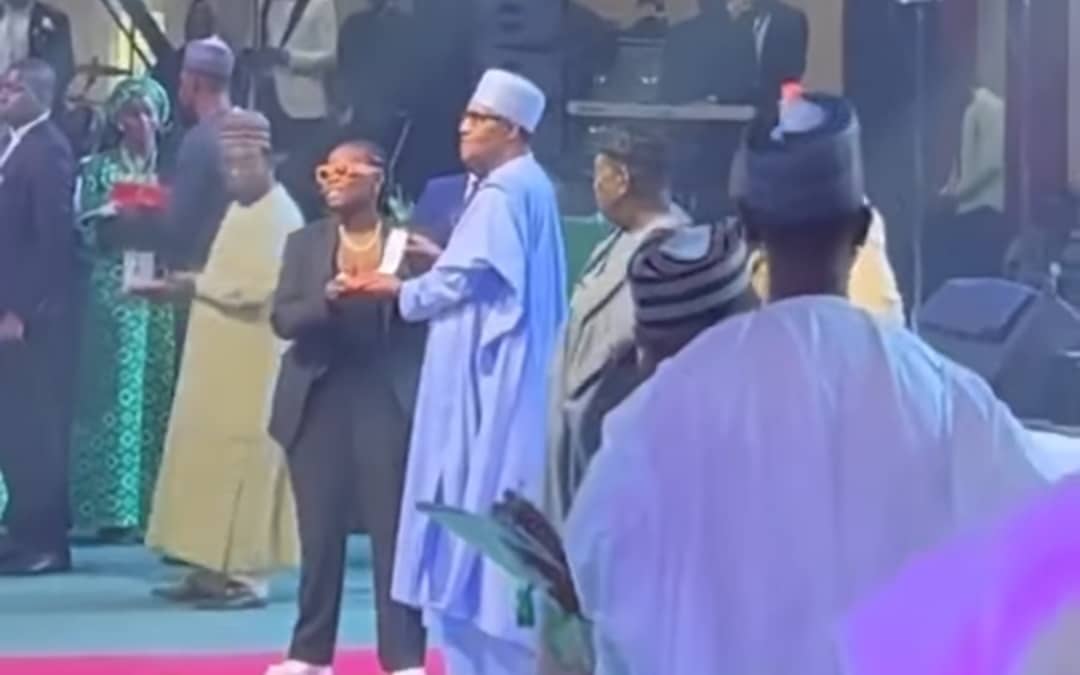National Honours awards should be honourable
About 450 citizens, including seven foreign nationals, were on Tuesday, October 11, 2022, conferred with various categories of Nigeria’s national honours by President Muhammadu Buhari. Speaking at the award ceremony in Abuja, President Buhari said people who contribute to national development deserve to be encouraged and appreciated. He acknowledged that the list of the 2022 […]

About 450 citizens, including seven foreign nationals, were on Tuesday, October 11, 2022, conferred with various categories of Nigeria’s national honours by President Muhammadu Buhari. Speaking at the award ceremony in Abuja, President Buhari said people who contribute to national development deserve to be encouraged and appreciated.
He acknowledged that the list of the 2022 awardees was justifiably long because the exercise had not been carried out since 2015. He said there had not been such occasion as this since the inception of his administration except for the special investiture ceremony in honour of the late Chief MKO Abiola, Alhaji Babagana Kingibe and Chief Gani Fawehinmi, adding that the investiture ceremony for Abiola and others was carried out to right past wrongs, assuage feelings and for the sanctity of the electoral process and the country’s democracy.
Mr President commended the National Awards Committee, headed by retired Justice of the Supreme Court and Emir of Lafia, Justice Sidi Bage Muhammad, for diligently going through over 5,000 submissions and coming up with recommendations that formed the basis of the awards. He noted that the screening and selection of nominees for the 2022 awards, as always, followed established broad criteria in accordance with the National Honours Act CAP.N43 of the Laws of the Federation of Nigeria 2004.
The criteria, President Buhari explained, included “consistent and meaningful participation in community and/or national development; rendering unsolicited, selfless and philanthropic services to humanity; outstanding sacrifice in the defence of a cause popularly adjudged to be positive, relevant and beneficial to the nation and community”. Other criteria listed by the president for selecting the recipients were distinct act of bravery in the protection and/or defence of national interest, public peace, safety of life and property, remarkable achievement in any field of expertise, where the person’s activities in that field have made significant contributions to the attainment of national goals and objectives. Service with integrity is also a basis for the selection process.
The awards, which were in 10 different medal categories include the Grand Commander of the Order of the Niger (GCON), Commander of the Order of Federal Republic (CFR), Commander of the Order of the Niger (CON), and Officer of the Order of the Niger (OON).
Some of the recipients include Senate President, Dr Ahmad Lawan; Chief Justice of Nigeria (CJN) Justice Olukayode Ariwoola; former CJN, Justice Ibrahim Tanko Muhammad; Secretary to the Government of the Federation, Boss Mustapha; and former Minister of Finance, Dr Ngozi Okonjo-Iweala. Also, on the list are the Deputy Secretary-General of the United Nations (UN), Amina J. Mohammed; Nigeria’s Permanent Representative to the UN, Professor Tijjani Muhammad-Bande; a religious leader who hid over 262 Christians in his mosque from attack in Yelwa Gindi Akwati village, in Plateau State, Imam Abdullahi Abubakar; Damini Ebunoluwa Ogulu (Burna Boy); Ms. Josephine Agu, an airport cleaner who returned $12,200 found in a toilet at the Murtala Muhammed International Airport, Lagos. We commend the government for particularly recognising the cleaner and the Jos cleric, as this will encourage more Nigerians to toe that path.
The fact that many of the 2022 awardees are people in government as public officers and political office holders, including those around President Buhari, however, made the list of recipients a mockery of the philosophy behind national honours. The exclusion of the former Senate president, Bukola Saraki, from the same list that recognised the serving Senate president also made it a subject of controversy. If recognition for a national honour is about tangible contributions, how fair is the nomination and how thorough, also, is the assessment of a public officer whose tenure in office is still running? It is only decent and reasonable that public officers, appointed and elected, are honoured after they have left office; whence their contributions could be measured empirically and their nomination seen to be justified.
The appearance of some names on the list of honourees leaves Nigerians to wonder and search for the contributions of such awardees; suggesting that government is steadily reducing national honours to wining elections or getting appointed into a public office. It is important to state that if awards/honours are given to those less deserving, then it degrades the awards of those who actually deserve it.
Besides, while it may be in order to recognise some individuals more than once, the need to appreciate creativity and hard work of ingenious individuals requires government to beam its searchlight for unsung heroes who have made valuable contributions to humanity or national development but have never been recognised at all. It is believed that there are many Nigerians in this category who have rather remained unnoticed and unrecognised.
More critical, perhaps, than all this is the integrity of awardees after being conferred with national honours. National honours should go with a responsibility to preserve personal integrity and protect national interest. National honours should go beyond decorations and presidential handshake. Honourees have a responsibility to inspire and remain models to the younger generation of Nigerians. To achieve this, government is encouraged to withdraw national honours from any awardee whose strength of character, at any point, falls short of public and national expectations.
National honours should be honourable. It becomes honourable when the process is unquestionably transparent; when contributions by awardees are not far-fetched; and when awardees are not public officers serving under the administration conferring the award on them.
